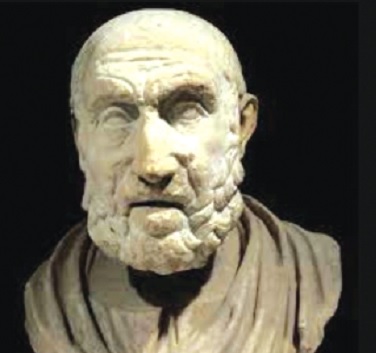Temperament Types?
A recent interesting discussion about how different human beings, particularly married couples, generally tend to be in terms of temperament, took me back to the “Temperament Types” we were taught in secondary school when we read Geoffrey Chaucer’s Canterbury Tales in 1966.
The law in Physics which states that like poles repel, while opposite-poles attract, appears to be very visible, and deeply-rooted in the institution of marriage.
While a wife may be the quiet type, the husband may often be the exact opposite, and vice versa.
So, while a calm or quiet young man marries an aggressive young lady often referred to as “alomo gyata” (sweetheart lioness), a calm and quiet lady marries the rowdiest young man in town referred to as “Kofi Basabasa.”
However, to the extent that there are very few absolutes in nature, and that “birds of the same feather flock together,” it is also not uncommon to find couples of similar temperaments together.
Hippocrates’ Temperament types
Hippocrates (460-370 BC), the Greek physician and philosopher, who proffered an explanation to the temperament differences, is often referred to as “the father of modern medicine,” for writing over 70 books on medicine even though he lived over 2,400 years ago.
Indeed, the oath medical doctors swear on qualifying for the profession, called the Hippocratic Oath based on his ideals in medicine, derives from the name Hippocrates.
So, what are the four “Temperament Types” Hippocrates identified? He named them Choleric, Sanguine, Phlegmatic and Melancholic.
Hippocrates stated that every human being was influenced by certain internal chemicals he called “fluids” in him or her.
These “fluids” are responsible for our temperaments.
The four “temperament types” Hippocrates identified are Sanguine (Air), Choleric (Fire), Melancholic (Earth) and Phlegmatic (Water).
They are often referred to as “the temperament God gave you!” They try offering an explanation to why humans are generally who/what they are, and why it is so difficult trying to change the temperament of individuals from what they are into what they are not.
Sanguine — The sanguine is lively, happy-go-lucky, very active, compassionate and could be boisterous.
Sanguines tend to be attention-seekers and love being the centre of attraction.
They are people-oriented and extroverts.
Where they cannot sustain the interest of others in themselves, they lose interest and move on to more interesting things.
They are expressive, opportunistic, noisy and insincere, often playing to the gallery.
Choleric — Cholerics are serious, strong-willed, goal-oriented, hot-headed people who will sweep anybody in their way to achieve their goals.
They are intolerant and must always have their way.
They are go-getters and place achievement over relationships.
They are insensitive, direct, fearless and tactless.
Like Sanguines, they are extroverts.
Melancholic — Unlike the Sanguine and Choleric who are extroverts, the Melancholic are introverts.
They are prim and proper, perfectionist, meticulous, thoughtful, critical/fault-finding and detailed.
They like to have and do things their own way.
They are emotional, moody and easily get hurt.
Phlegmatic — Like the Melancholic, the Phlegmatic are introverts.
They are gentle, kind, caring, peaceful, relaxed and sometimes timid.
They never rock the boat and get on with everybody.
Professions
With professions, some temperaments are considered more advantageous to individuals than others.
For example, in the military where dangers in the field need to be overcome aggressively and fearlessly for success, an aggressive choleric temperament may be preferable.
On the other hand, in academia, a calm, detailed, empathetic and meticulous professor or teacher might be the best for students.
Being prim and proper and fault-finding, the melancholic can bring out the best in their students.
For the Sales profession, a confident people-oriented sweet-talking sanguine individual might be the best.
Overall, however, a tinge of the phlegmatic’s kind, gentle and peaceful qualities underlying the other three temperaments could be an advantage in most situations!
Even though the phenomenon of “Temperament Types” was explained and given credence to by Hippocrates over two thousand years ago, it is still used as basis for, though not mathematically or in absolute terms, to explain why humans behave the way they do.
However, it does not make up for leadership inadequacies of politicians who appeal passionately to the electorate to be given a chance to lead, only to renege on their promise.
Leadership
For Ghana, whatever the temperament a leader may have, what Ghanaians need is an honest, sincere, compassionate and truthful leader of integrity and strength with a vision, to move Ghana forward.
Over 60 years after independence, the present economic mess in which we find ourselves where bonds of pensioners are attacked with such wicked cruelty and callousness, making some contemplate suicide as an option, is unacceptable in any leader irrespective of being choleric, sanguine, phlegmatic or melancholic.
Leadership must be human, humane and humble, and not arrogant and cavalier in dealing with the lives of lesser mortals, in their estimation!
Leadership, lead! Fellow Ghanaians, wake up!
The writer is former CEO, African Peace Support Trainers Association, Nairobi, Kenya and Council Chairman, Family Health University College, Accra, Ghana.
E-mail: dkfrimpong@yahoo.com


